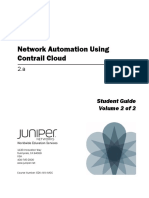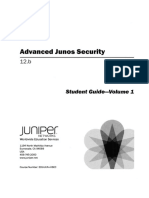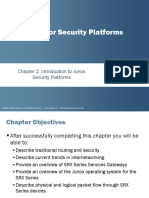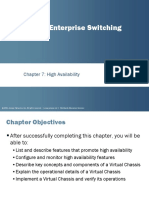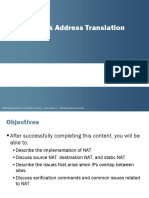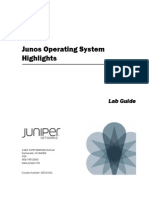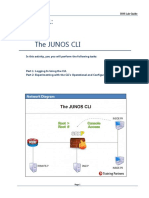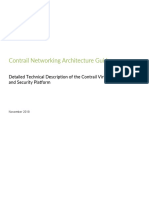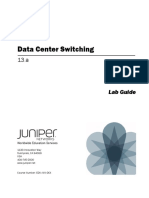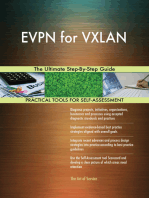Advanced Junos Security Ajsec
Advanced Junos Security Ajsec
Uploaded by
pismo76aCopyright:
Available Formats
Advanced Junos Security Ajsec
Advanced Junos Security Ajsec
Uploaded by
pismo76aOriginal Description:
Copyright
Available Formats
Share this document
Did you find this document useful?
Is this content inappropriate?
Copyright:
Available Formats
Advanced Junos Security Ajsec
Advanced Junos Security Ajsec
Uploaded by
pismo76aCopyright:
Available Formats
AJSEC: Advanced Junos Security
Course No: EDU-PROT-AJSEC Length: Three days Onsite Price: $19500 for up to 12 students Public Enrollment Price: $2100/student Course Level AJSEC is an advanced-level course. Prerequisites Students should have a strong level of TCP/IP networking and security knowledge. Students should also attend the "Introduction to the Junos Operating System" (IJOS), "Junos Routing Essentials" (JRE), and "Junos Security" (JSEC) courses prior to attending this class. About this Course This three-day course, which is designed to build off of the current Junos Security (JSEC) offering, delves deeper into Junos security with advanced coverage of IPsec deployments, virtualization, high availability, advanced Network Address Translation (NAT) deployments, and Layer 2 security with SRX Series Services Gateways. Through demonstrations and hands-on labs, students will gain experience in configuring and monitoring advanced security features of the Junos operating system. This course is based on the Junos OS Release 10.4R1.9. Objectives After successfully completing this course, you should be able to: Demonstrate understanding of concepts covered in the prerequisite "Junos Security" course. Describe the various forms of security supported by the Junos OS. Describe Junos security handling at Layer 2 versus Layer 3. Describe the placement and traffic distribution of the various components of SRX devices. Configure, utilize, and monitor the various interface types available to the SRX Series product line. Describe Junos OS processing of Application Layer Gateways (ALGs). Alter the Junos default behavior of ALG and application processing. Implement address books with dynamic addressing. Compose security policies utilizing ALGs, custom applications, and dynamic addressing for various scenarios. Use Junos debugging tools to analyze traffic flows and identify traffic processing patterns and problems. Describe Junos routing instance types used for virtualization. Implement virtual routing-instances. Describe and configure route sharing between routing instances using logical tunnel interfaces. Implement selective packet-based forwarding. Implement filter-based forwarding. Describe and implement static, source, destination, and dual NAT in complex LAN environments. Describe and implement variations of cone, or persistent NAT. Describe the interaction between NAT and security policy. Implement optimized chassis clustering. Describe IP version 6 (IPv6) support for chassis clusters. Differentiate and configure standard point-to-point IP Security (IPsec) virtual private network (VPN) tunnels, huband-spoke VPNs, dynamic VPNs, and group VPNs. Implement OSPF over IPsec tunnels and utilize generic routing encapsulation (GRE) to interconnect to legacy firewalls. Monitor the operations of the various IPsec VPN implementations.
Advanced Junos Security (AJSEC) rev. July 2011
Describe public key cryptography for certificates. Utilize Junos tools for troubleshooting Junos security implementations. Perform successful troubleshooting of some common Junos security issues. Intended Audience This course benefits individuals responsible for implementing, monitoring, and troubleshooting Junos security components. Course Contents Day 1 Chapter 1: Course Introduction Chapter 2: Junos Security Review
Junos Security Components Overview and Selective Packet-Based Forwarding Junos Layer 2 Packet Handling and Security Features Data Center and Branch Deployments Lab 1: Selective Forwarding Chapter 3: Security Policy Components
ALG Overview Junos ALGs Custom Application Definitions Advanced Addressing Policy Matching Lab 2: Implementing Advanced Security Policy Chapter 4: Virtualization
Day 2
Virtualization Overview Routing Instances Filter-Based Forwarding Lab 3: Implementing Junos Virtual Routing
Chapter 5: Advanced NAT Concepts Operational Review NAT: Beyond Layer 3 and Layer 4 Headers Advanced NAT Scenarios Lab 4: Advanced NAT Implementations Chapter 6: High Availability Clustering High Availability Overview Chassis Clustering Implementations Advanced HA Topics
Advanced Junos Security (AJSEC) rev. July 2011
Lab 5: Implementing Advanced High Availability Techniques Chapter 7: IPsec Implementations
Standard VPN Implementations Review Public Key Infrastructure Hub-and-Spoke VPNs Lab 6: Hub-and-Spoke IPsec VPNs
Day 3 Chapter 8: Enterprise IPsec Technologies: Group and Dynamic VPNs Group VPN Overview GDOI Protocol Group VPN Configuration and Monitoring Dynamic VPN Overview Dynamic VPN Implementation Lab 7: Configuring Group VPNs Chapter 9: IPsec VPN Case Studies and Solutions Routing over VPNs IPsec with Overlapping Addresses Dynamic Gateway IP Addresses Enterprise VPN Deployment Tips and Tricks Lab 8: OSPF over GRE over IPsec VPNs Chapter 10: IPsec VPN Case Studies and Solutions Troubleshooting Methodology Troubleshooting Tools Identifying IPsec Issues Lab 9: Performing Security Troubleshooting Techniques Appendix A: SRX Series Hardware and Interfaces Branch SRX Platform Overview High-End SRX Platform Overview SRX Traffic Flow and Distribution SRX Interfaces
Advanced Junos Security (AJSEC)
rev. July 2011
You might also like
- NeoDyne Product InfoDocument12 pagesNeoDyne Product Inforikof rikofNo ratings yet
- Homes England Graduate Programme Guidance 2024: The Housing and Regeneration AgencyDocument7 pagesHomes England Graduate Programme Guidance 2024: The Housing and Regeneration AgencyMadeline JonesNo ratings yet
- Jncie Ent SampleDocument26 pagesJncie Ent Samplerohanxelnaga100% (1)
- AJSPR 10.a-R LGD PDFDocument304 pagesAJSPR 10.a-R LGD PDFAdaNo ratings yet
- MIXEL - User ManualDocument19 pagesMIXEL - User ManualErnesto RiquelmeNo ratings yet
- Catalogo Escavadeira Fh200Document430 pagesCatalogo Escavadeira Fh200Jose Wellington Silva dos SantosNo ratings yet
- Advanced Juniper Security (AJSEC)Document3 pagesAdvanced Juniper Security (AJSEC)HUNG NGO MINHNo ratings yet
- Jncis Sec P1Document211 pagesJncis Sec P1fortinet123No ratings yet
- JNCIE-SEC-11.a C5 Policies - PpsDocument33 pagesJNCIE-SEC-11.a C5 Policies - PpsYang JerryNo ratings yet
- NACC SG 2of2Document288 pagesNACC SG 2of2casrilalsiNo ratings yet
- Junos Intermediate Routing JirDocument1 pageJunos Intermediate Routing JirNagiReddy KonatamNo ratings yet
- JSEC EX InstructorNotes 30may2010Document9 pagesJSEC EX InstructorNotes 30may2010Jorge GaitanNo ratings yet
- Jsec 17.aDocument2 pagesJsec 17.aRizwan Ahmed AnsariNo ratings yet
- Advanced Junos Security (AJSEC) : What You'll LearnDocument3 pagesAdvanced Junos Security (AJSEC) : What You'll Learnashish kumarNo ratings yet
- Advanced Junos SecurityDocument534 pagesAdvanced Junos Securityjohn fallon0% (1)
- JSEC C2 Arch 10.a.ppsDocument34 pagesJSEC C2 Arch 10.a.ppsJorge GaitanNo ratings yet
- Junos Unified Threat Management: Student GuideDocument174 pagesJunos Unified Threat Management: Student GuideMhnibrahim Elhadi100% (1)
- NACC SG 1of2Document190 pagesNACC SG 1of2casrilalsiNo ratings yet
- IJOS Lab Guide - Lab3.ReadyDocument23 pagesIJOS Lab Guide - Lab3.ReadyaloneyeNo ratings yet
- Contrail Use CasesDocument35 pagesContrail Use Casessripathy.balaji4908100% (1)
- 10.a-R LDDocument14 pages10.a-R LDTrịnhVạnPhướcNo ratings yet
- Junos Enterprise Switching: Chapter 7: High AvailabilityDocument57 pagesJunos Enterprise Switching: Chapter 7: High AvailabilityitnewclassNo ratings yet
- JNCIS SEC PPT - Firewall Authentication - Coruse 10.aDocument32 pagesJNCIS SEC PPT - Firewall Authentication - Coruse 10.aJorge GaitanNo ratings yet
- JNCIS SEC PPT - Security Policies - Coruse 10.aDocument48 pagesJNCIS SEC PPT - Security Policies - Coruse 10.aJorge GaitanNo ratings yet
- JIR-12.a LDDocument48 pagesJIR-12.a LDAnderson OlivierNo ratings yet
- JNCIE-SEC-11.a C7 NAT - PpsDocument37 pagesJNCIE-SEC-11.a C7 NAT - PpsYang JerryNo ratings yet
- JSEC 12.a-R LD PDFDocument16 pagesJSEC 12.a-R LD PDFrNo ratings yet
- A Dvanced Junos Security: Lab DiagramsDocument43 pagesA Dvanced Junos Security: Lab DiagramsAssem SamirNo ratings yet
- JSEC 12.a-R LGDDocument208 pagesJSEC 12.a-R LGDTucsi2000No ratings yet
- Junos Operating System Highlights (SSFJUN01Ia - LabGuide)Document50 pagesJunos Operating System Highlights (SSFJUN01Ia - LabGuide)C8H10N4O21No ratings yet
- JL2V 21 A Lab GuideDocument184 pagesJL2V 21 A Lab GuideJustinNo ratings yet
- Jsec 12.b SG Vol.1Document322 pagesJsec 12.b SG Vol.1Khanh NguyenNo ratings yet
- Applying Junos Configuration AutomationDocument102 pagesApplying Junos Configuration Automationdream208No ratings yet
- ClassOfService - JunosDocument71 pagesClassOfService - Junosalanvg29No ratings yet
- JNCIE-SEC-11.a C2 ExamStrategies - PpsDocument16 pagesJNCIE-SEC-11.a C2 ExamStrategies - PpsYang JerryNo ratings yet
- IJOS Lab Guide - Lab1.ReadyDocument17 pagesIJOS Lab Guide - Lab1.ReadyaloneyeNo ratings yet
- JNCIE-SEC-11.a C9 UTMandScreeningOptions - PpsDocument55 pagesJNCIE-SEC-11.a C9 UTMandScreeningOptions - PpsYang JerryNo ratings yet
- JNCIEDocument15 pagesJNCIESon Tran Hong NamNo ratings yet
- Jljntper: Ativanced Junos Enterprise Security TroubleshootingDocument23 pagesJljntper: Ativanced Junos Enterprise Security TroubleshootingAssem SamirNo ratings yet
- Management Network Diagram: Student Virtual EnvironmentDocument10 pagesManagement Network Diagram: Student Virtual Environmentcatalin ionNo ratings yet
- Apstra User GuideDocument1,254 pagesApstra User GuidegranNo ratings yet
- Jncis Ent SwitchingDocument189 pagesJncis Ent Switchingbubu beanNo ratings yet
- Exam JN0-633Document83 pagesExam JN0-633Haffiz AnugragiriNo ratings yet
- Junos Layer 3 VPNs (JL3V) PDFDocument2 pagesJunos Layer 3 VPNs (JL3V) PDFAkshay KumarNo ratings yet
- JNCIE-SEC-11.a - C10 - Extended ImplementationConcepts - PpsDocument24 pagesJNCIE-SEC-11.a - C10 - Extended ImplementationConcepts - PpsYang JerryNo ratings yet
- Advanced Junos Service Provider Routing: High-Level Lab GuideDocument120 pagesAdvanced Junos Service Provider Routing: High-Level Lab GuideAdaNo ratings yet
- Visit Passleader and Download Full Version Jn0-333 Exam DumpsDocument5 pagesVisit Passleader and Download Full Version Jn0-333 Exam DumpsbrotherNo ratings yet
- JMF 15.a SGDocument374 pagesJMF 15.a SGridha80100% (1)
- CURSO OJXE SG 9.aDocument582 pagesCURSO OJXE SG 9.aklefoNo ratings yet
- SRX For BeginnersDocument6 pagesSRX For BeginnersSon Tran Hong NamNo ratings yet
- Junos Space Security Director Technical Overview Student GuideDocument67 pagesJunos Space Security Director Technical Overview Student GuideKORATE BOYNo ratings yet
- Routing FundamentalsDocument34 pagesRouting FundamentalsHamid Chaar CasarrubiaNo ratings yet
- SRX HA Deployment Guide v1.2Document35 pagesSRX HA Deployment Guide v1.2Haider AliNo ratings yet
- JMV LabGuide Volume1Document324 pagesJMV LabGuide Volume1pvsairamNo ratings yet
- JMV 12.a High Level Lab Guide PDFDocument270 pagesJMV 12.a High Level Lab Guide PDFLi KangNo ratings yet
- SG 010 Contrail Networking Arch GuideDocument53 pagesSG 010 Contrail Networking Arch GuidedhkhtnNo ratings yet
- JNICA - CLOUD DUMB (Latest) PDFDocument40 pagesJNICA - CLOUD DUMB (Latest) PDFRajdeep Dash Sojib50% (2)
- DCX 13.a R - LGDocument216 pagesDCX 13.a R - LGrajm791No ratings yet
- SRX Cluster Monitoring Best PracticesDocument94 pagesSRX Cluster Monitoring Best PracticesHaider AliNo ratings yet
- Cisco Certified Design Professional A Complete Guide - 2020 EditionFrom EverandCisco Certified Design Professional A Complete Guide - 2020 EditionNo ratings yet
- 2014 Volkswagen CC Brochure PDFDocument13 pages2014 Volkswagen CC Brochure PDFtimshinNo ratings yet
- Operacion y Mantenimiento Cargador Doosan dl320 02Document11 pagesOperacion y Mantenimiento Cargador Doosan dl320 02kzarate.crybNo ratings yet
- Inter-Task CommunicationDocument21 pagesInter-Task CommunicationAnonymous N1sYTvEMXQNo ratings yet
- Konica Minolta Pagepro 1300w-1350w Service ManualDocument105 pagesKonica Minolta Pagepro 1300w-1350w Service Manualc64thorgalNo ratings yet
- Road and Highway: Reality Modeling For Going Digital StrategyDocument34 pagesRoad and Highway: Reality Modeling For Going Digital Strategymaanuraya100% (1)
- Introduction: Cloud Computing: Theory and Practice. Dan C. MarinescuDocument31 pagesIntroduction: Cloud Computing: Theory and Practice. Dan C. Marinescusafwansadaan7No ratings yet
- Ebooks File How Computers Really Work A Hands On Guide To The Inner Workings of The Machine 1st Edition Matthew Justice All ChaptersDocument62 pagesEbooks File How Computers Really Work A Hands On Guide To The Inner Workings of The Machine 1st Edition Matthew Justice All Chaptersfailybaluci33100% (7)
- Centrifugal PumpDocument187 pagesCentrifugal PumpustunNo ratings yet
- BDM Introduction DeckDocument10 pagesBDM Introduction DeckJunelle Siege GarciaNo ratings yet
- aQUA MasterDocument20 pagesaQUA MasterFIRMANSYAHNo ratings yet
- Assessment and Durability of StructureDocument10 pagesAssessment and Durability of StructureKrishnendra ShuklaNo ratings yet
- Alignment Framework Between Building Inf PDFDocument135 pagesAlignment Framework Between Building Inf PDFefiolNo ratings yet
- Journal Pre-Proof: Digital Communications and NetworksDocument20 pagesJournal Pre-Proof: Digital Communications and NetworksOussema OUERFELLINo ratings yet
- HP Prime User's ManualDocument3 pagesHP Prime User's ManualCesar CyT-TopografíaNo ratings yet
- Barcoding InformaticsDocument10 pagesBarcoding Informaticsapi-650274498No ratings yet
- NCPP VenDocument12 pagesNCPP VenShikhaNeeraj AggarwalNo ratings yet
- BMW E9x Code List V1editDocument122 pagesBMW E9x Code List V1editJustin CraigNo ratings yet
- Ibm c1000 156Document20 pagesIbm c1000 156Abdulrahman HammadNo ratings yet
- Gigabyte z97pd3 ManualDocument40 pagesGigabyte z97pd3 ManualRiccardoFlaskNo ratings yet
- 3g Prepaid Mobile InternetDocument7 pages3g Prepaid Mobile InternetMd Amir HossainNo ratings yet
- ResumeDocument1 pageResumeAlisa BisopNo ratings yet
- PRINOTH PANTHER T16 RubberTracks Implement-Ready EN Web 05Document2 pagesPRINOTH PANTHER T16 RubberTracks Implement-Ready EN Web 05Jose Manuel ReyesNo ratings yet
- GalatiDocument64 pagesGalatiadrianprocaNo ratings yet
- Training MaterialDocument15 pagesTraining MateriallazaroccsNo ratings yet
- EZP2010Document22 pagesEZP2010rendercatNo ratings yet
- Module 4 - 1Document47 pagesModule 4 - 1Darshan BabuNo ratings yet









